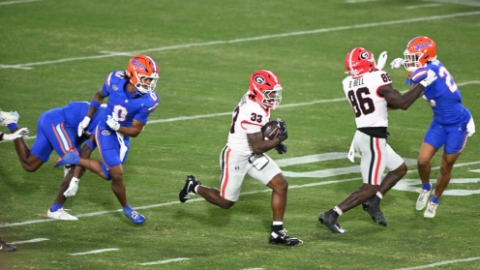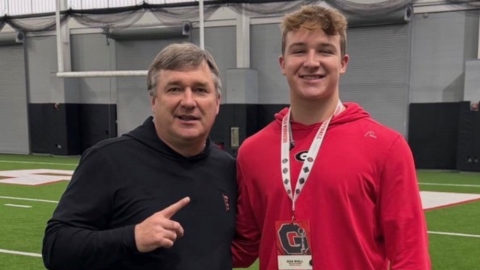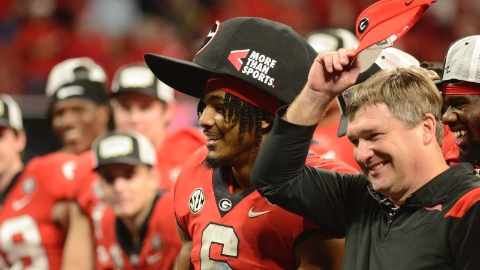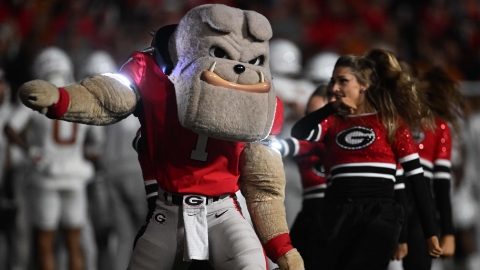SEC COMMISH: "Disappointing news for everyone involved"
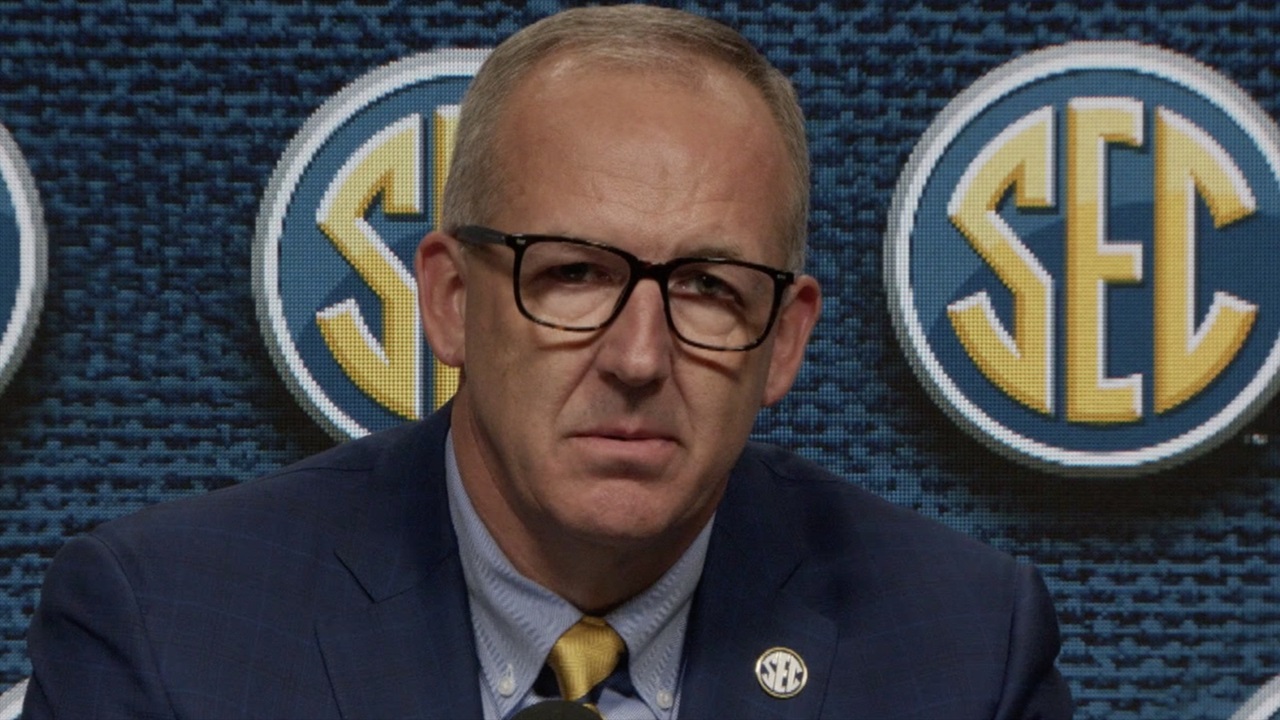
COMMISSIONER GREG SANKEY: When I woke up this morning, I did not anticipate being here with you at this moment in this fashion today with this news.
I am going to take a moment. I just walked into the holding area. Breein has been someone we've watched in our Basketball Leadership Council since his freshman year. He is the chair. That's what we do, we build young people up.
That said, I'm here because we had to make some difficult decisions through the day. We're going to continue with our tournament. I continue to believe it's important that we give all 14 teams who arrived here in Nashville the opportunity to play for a conference tournament championship, our automatic bid. We're going to continue to do that.
As the day progressed, we received some news, some information, from the NCAA, particularly the Board of Governors, information from what is called the COVID- 19 Advisory group, a group of 11 or 12 people, 6 are medical doctors, experts in their field. I'm certainly not an immunologist or infectious disease specialist.
After the news broke from the NCAA, we were with our athletics directors, we convened a conference call of our presidents and chancellors and advanced the recommendation that we alter our fan access, which we've done. We sent a press release that communicates that.
We've also altered access to our regular season events on campus, both conference versus conference and conference teams versus non-conference teams between tomorrow, March 12th, and Monday, March 30th. We'll obviously be reviewing circumstances during that time to see if that may be extended or we can conclude our approach on March 30th and return
to operations as usual.
Disappointing news for everyone involved. It is important to give our student-athletes this opportunity. We've prepared to do that in a healthy environment. The Nashville Predators have been phenomenal partners both in dealing with this news and preparing the arena so that we can meet those health expectations.
The news for the city is not what I wanted to provide given, what, over a week ago, a tornado hit. We were planning to raise relief funds here. That's obviously been altered. We'll need to recalibrate. This city is one of the many that's the heartbeat of the SEC, we want to be supportive given our long-term relationship.
With that, I'll do my best to answer the questions you may have.
Q. How will the refund process work for fans?
COMMISSIONER GREG SANKEY: We have said in our release, just so that I use words, it's a later paragraph: Fans who are the original purchaser of the tickets from the SEC office and SEC university, a verified purchaser on the SEC ticket exchange through Ticketmaster, will receive automatic refunds of those ticket purchases.
We obviously don't control what's happened on the secondary market, but we'll take the approach as I described with those through official outlets.
Q. Were you advised of the NBA's decision tonight? Was there any discussion about shutting down altogether?
COMMISSIONER GREG SANKEY: I learned of the NBA's decision 15 minutes ago, probably right before it broke publicly. We have not discussed with intent not holding the event. As you can imagine, when you go through contingency planning at the conference office, we have considered that, but we don't believe we're there.
The public health officials in Nashville have been our source of information. That's why we've continued as we did tonight. The change at the national level has altered our approach but hasn't put us at this point into cancellation.
I was at dinner saying I'm excited to have fans and play last night, so this is a fluid situation and we're mindful of the fluidity.
Q. What assurances can you give, what precautions are you taking to protect players from each other? How do you know you don't have an infected player?
COMMISSIONER GREG SANKEY: We convened a call last Friday of our sports medicine professionals on campus. Each of our universities and their teams are fully attentive to their condition.
Sitting here today, that's a responsibility they undertake on a daily basis for their student-athletes, not the commissioner or conference office. We're confident in the work they do with their student-athletes.
Q. The NCAA advised against allowing fans in around 3:30. Obviously you made the decision to allow fans in. What went into that decision?
COMMISSIONER GREG SANKEY: First of all, the local information was that we could conduct our tournament safely with fans through the weekend. What has happened is the national recommendation has changed the dynamics for us. Given that people have traveled, given that we were prepared from a public safety standpoint, and on a Wednesday evening you can find enough space to separate yourselves, I felt confident in making the recommendation that we move forward.
I might also add, we needed time to convene our folks to make a decision. With that in mind, that's why I recommended we move forward as I described.
Q. As someone who works in college athletics, when you found out that the NCAA was going to do what it did, were you surprised, shocked, or were you thinking this is part of the time in which we're living?
COMMISSIONER GREG SANKEY: Surprise, shock, probably a few other words that came to mind. Disappointment. We have a national association for which I have great respect, but there are those frustrating times. The ability to have information to make decisions in the best manner possible is important to all of us.
With full knowledge, we had a conference tournament at this level in the ACC start yesterday, so you can imagine the enormous difficulty that we're faced with in making these decisions, making these adjustments, informing people, some of who have probably traveled here, others who were ready to go.
But respect that medical leaders, experts, have provided a recommendation. I wish it may have been earlier or perhaps later, it's the best information available now, and we have to respect that.
As I walk through the day, from the initial analysis, you clear your mind and you start working through decisions that have to be made. That's the responsibility that I have as the commissioner of this conference.
Then I'm sure that the emotions will return at some point after I unwind, and we'll refocus pretty quickly to get back to work. But I understand the disappointment for everybody. Perhaps I don't understand it in the same way, but I have my own disappointment because I've come to love this event, love having it in this city.
'Disappointing' is a good word, but we also have a reality around public health which we're managing.
Q. The decision to also have no fans on the on- campus events, whatever it may be, was there additional information that went into that? It's a different set of circumstances than having 20,000 people in one place.
COMMISSIONER GREG SANKEY: Several pieces of information. One was there were actual releases from the NCAA national office, one from the COVID-19 Advisory Panel, as I recall, that spoke to the concerns with having large gatherings around sporting events. So that was a moment.
We also have two universities this week who after spring break, one has canceled its classes and will move to online content delivery next week. Another has identified the need for online delivery where it's possible, that being Vanderbilt and the University of Florida.
We have, I don't know, five or six on spring break now. We have contingency planning taking place, we have other announcements of delays of return to classes. We're managing an environment on campus to which we're all learning and adapting.
Part of it was the messaging added on top of all that today from this advisory panel.
Q. Can you take us through a timeline of today, who you spoke with, how you came to that final conclusion.
COMMISSIONER GREG SANKEY: I won't hit all of it. We had a working group meeting of something unrelated. We began an athletic directors meeting at 9:30 and had already revised an agenda for a previously-scheduled meeting to focus on the COVID- 19 Coronavirus up front. We talked about options. One of the things on our minds was allowing fans to just return tickets, kind of self-selecting not to attend, lessen attendance and provide refund information.
We held that. We went through a lot.
About an hour and a half, took a break. We were talking about issues that are also on our agenda. Information started to come from a Congressional hearing that was very specific. The World Health Organization issued a declaration of a pandemic. You could tell that our room changed as we saw that information.
So the focus on the agenda, we took a break, started in conversation with some of my leadership at the presidential level, with some of our local hosts, then that played out.
I think we had probably a conference call among the autonomy commissioners early afternoon, right around 3:00 I'm guessing a note from the NCAA about impending news, then the news, then we reengaged at 3:30. I think we were able to connect with our presidents, chancellors, athletic directors in person and via conference calls about 5:30.
Q. (No microphone.)
COMMISSIONER GREG SANKEY: In a meeting that began at 5:30. That was limited by travel and availability issues.
Q. What would it take to at some point cancel this tournament? Would it have to be a more serious situation in the community here in Nashville?
COMMISSIONER GREG SANKEY: Our preceding conversations were about local public health advice, and that would remain.
Q. Obviously we're sitting at the basketball tournament. How much discussion was there about other SEC tournaments coming up, gymnastics?
COMMISSIONER GREG SANKEY: We've been mindful because this is our fourth consecutive week of conference championships swimming and diving, indoor track and field, women's basketball, men's basketball. Gymnastics next week will have the same approach, limited attendance, limited to family of student-athletes and official party and media members who are credentialed.
Equestrian is the following week in Athens, Georgia. We'll have the same approach there. It's campus based. The nature of that sport is just a little bit different than some that are contained in this way. But we'll take the same approach to that event.
We have a break for about four weeks. We'll be on the other side of March 30. We'll be in conversation to see what that means. Tennis and golf are up next in mid, late April. Then we go into softball, outdoor track and field, baseball in May.
We have some time to assess, which we certainly will be doing. But we spent time up front knowing we had men's basketball now, we had gymnastics that would be affected by this decision, and even the equestrian championship in a few weeks.
Q. Spring football is underway. What kind of conversation have you had with different coaches as far as the spring games?
COMMISSIONER GREG SANKEY: We had very brief conversations about spring games and various activities. We'll be reconnecting. I think most of those are outside of our March 30 window. I'm not exactly certain that I track on that.
We're proceeding with other things. We have I think a video review session this weekend for football preparation. Some elements will continue. We obviously have been in a crisis consideration, a crisis management situation, so that's kept our attention on the immediate issues I've described. We'll be reconnecting both as a staff tonight and in the future days and weeks, then with our athletics directors.
